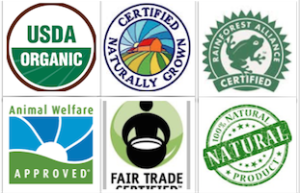What do Food Certifications Mean?
 Shopping for sustainably grown foods can be confusing because of all the different terms and jargon that companies use to market their foods. Some of their claims are backed by certification systems, and some aren’t verified by anyone at all. Here’s an overview of some of the major labels and certifications out there:
Shopping for sustainably grown foods can be confusing because of all the different terms and jargon that companies use to market their foods. Some of their claims are backed by certification systems, and some aren’t verified by anyone at all. Here’s an overview of some of the major labels and certifications out there:
Certified Organic
Organic products contain no genetically modified organisms, and are produced without the use of pesticides, herbicides, or synthetic fertilizers, or any other prohibited substance.
Certified Naturally Grown
CNG is a grassroots, peer-reviewed alternative to organic certification. Georgia has a well- developed CNG scene. CNG was developed an organization of farmers to be a verifiable, ethical alternative to the high-cost of USDA Organic Certification.
Fair Trade Certified
Fair Trade guarantees that companies pay workers and farmers a fair wage, use environmentally safe practices, and provide safe working conditions. It also supplies community development funds to provide training and resources.
Rainforest Alliance Certified
This certification verifies that the growers and farmers use socially and environmentally responsible practices. It can apply to anything from beauty products to food.
Animal Welfare Approved
(AWA) certification requires audited, high-welfare slaughter practices and living conditions. They require pasture access and only certify family farms. AWA provides an objective measurement of the humane-ness of an animal product.
100% or All Natural
FDA has not developed a definition for use of the term natural or its derivatives. However, the agency has not objected to the use of the term if the food does not contain added color, artificial flavors, or synthetic substances. Natural does not mean it is necessarily healthy, has no additives, or unprocessed.
